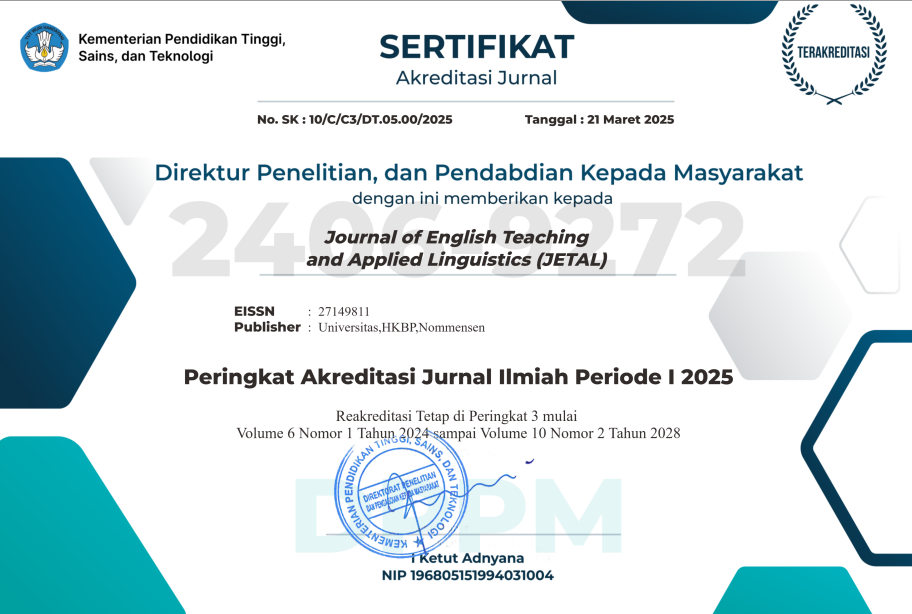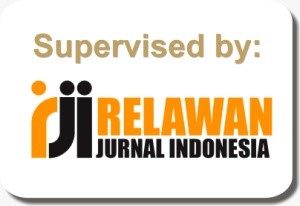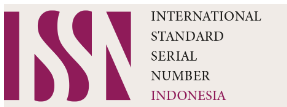ELT During The Covid-19 Pandemic; Practices and Challenges
Abstract
The purpose of this study is to evaluate the practices and challenges of online learning or so called Learning From Home (LFH) in English Department during the even semester 2019/2020 academic year. The subject of this study are 8 lecturers of English Department at STKIP Al Hikmah. This study employed descriptive qualitative research design. The instrument used is daily online teaching monitoring and evaluation questionnaire. The result of this study is categorized into five aspects namely 1) online learning applications frequently used by the lecturers are WhatsApp, Google Classroom, Schoology, Quizizz, E-mail, Zoom Cloud Meeting, Email, and Youtube 2) online learning activities frequently conducted by the lecturers are uploading materials, discussion forum, conducting quizzes, uploading assigment,, and video conferences, 3) scheduled assignment submission rate, 4) students’ participation rate and 5) challenges and alternative solution proposed by the lecturers during the online learning.
References
Allo, M. D. G. (2020). Is the online learning good in the midst of Covid-19 Pandemic ? The case of EFL learners. Jurnal Sinestesia, 10(1), 1–10.
Arkorful, V., & Abaidoo, N. (2015). The role of e-learning, advantages and disadvantages of its adoption in higher education. International Journal of Instructional Technology and Distance Learning, 12(1), 29–42.
Baker, A. (2003). Faculty development for teaching online: Educational and technological issues. The Journal of Continuing Education in Nursing, 34(6), 273-278.
Campbell, J. L. (2004). Institutional change and globalization. Princeton University Press.
Dabbagh. N., & NannaRitland, B. (2005). Online learning: Concepts, strategies and application. New Jersey, NJ: Upper Saddle River.
Eko Yulianto, Putri Dwi Cahyani, & Sofia Silvianita. (2020). Perbandingan Kehadiran Sosial dalam Pembelajaran Daring Menggunakan Whatsapp groupdan Webinar Zoom Berdasarkan Sudut Pandang Pembelajar Pada Masa Pandemic COVID-19. JARTIKA Jurnal Riset Teknologi Dan Inovasi Pendidikan, 3(2), 331–341. https://doi.org/10.36765/jartika.v3i2.277
Ernawati, Y., Universitas, D., & Darma, B. (2020). Problematik Pembelajaran Daring. 13(1), 1–15.
Fauzi, I., & Sastra Khusuma, I. H. (2020). Teachers’ Elementary School in Online Learning of COVID-19 Pandemic Conditions. Jurnal Iqra’ : Kajian Ilmu Pendidikan, 5(1), 58–70. https://doi.org/10.25217/ji.v5i1.914
Hoq, M. Z. (2020). E-Learning During the Period of Pandemic (COVID-19) in the Kingdom of Saudi Arabia: An Empirical Study. American Journal of Educational Research, 8(7), 457–464. https://doi.org/10.12691/education-8-7-2
Irfan, M., Kusumaningrum, B., Yulia, Y., & Widodo, S. A. (2020). Challenges During the Pandemic: Use of E-Learning in Mathematics Learning in Higher Education. Infinity Journal, 9(2), 147. https://doi.org/10.22460/infinity.v9i2.p147-158
Johnson, H. P., & Mejia, M. C. (2014). Online learning and student outcomes in California's community colleges. Public Policy Institute.
Nkonge, B., & Gueldenzoph, L. E. (2006). Best practices in online education: Implications for policy and practice. Business Education Digest, (15).
Riyanda, A. R., Herlina, K., & Wicaksono, B. A. (2020). Evaluasi Implementasi Sistem Pembelajaran Daring Fakultas Keguruan dan Ilmu Pendidikan Universitas Lampung. Jurnal IKRA-ITH Humaniora, 4(1), 66–71. https://journals.upi-yai.ac.id/index.php/ikraith-humaniora/article/view/669
Salem M. Alqahtani, M., Bhaskar, C. V., Vadakalur Elumalai, K., & Abumelha, M. (2018). WhatsApp: An Online Platform for University-Level English Language Education. Arab World English Journal, 9(4), 108–121. https://doi.org/10.24093/awej/vol9no4.7
Urdan, T. A., & Weggen, C. C. (2000). Corporate elearning: Exploring a new frontier.
Widiyono, A. (2020). Efektifitas Perkuliahan Daring (Online) pada Mahasiswa PGSD di Saat Pandemi Covid 19. Jurnal Pendidikan, 8(2), 169–177. https://doi.org/10.36232/pendidikan.v8i2.458
Authors retain copyright and grant the journal right of first publication with the work simultaneously licensed under a Creative Commons Attribution-ShareAlike 4.0 International License (CC BY-SA 4.0) that allows others to share the work with an acknowledgment of the work's authorship and initial publication in this journal.
Authors are able to enter into separate, additional contractual arrangements for the non-exclusive distribution of the journal's published version of the work (e.g., post it to an institutional repository or publish it in a book), with an acknowledgment of its initial publication in this journal.
Authors are permitted and encouraged to post their work online (e.g., in institutional repositories or on their website) prior to and during the submission process, as it can lead to productive exchanges, as well as earlier and greater citation of published work (See The Effect of Open Access).






